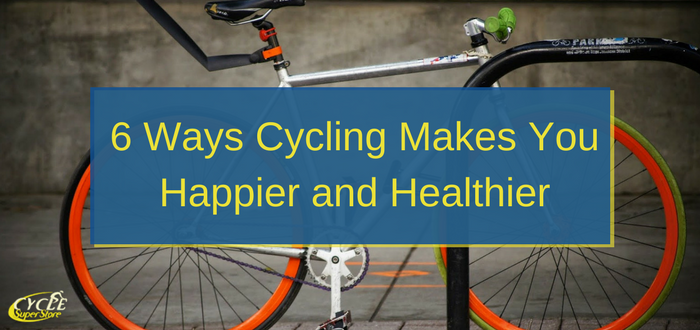Whether you had watched the Tour de France or you are just looking for an exciting way of exercise, cycling is scientifically proven to make you happier and healthier.
Blood flow to the brain can rise 28%-70% during cycling
According to the Journal of Cerebal Blood Flow and Metabolism (JCBFM), the blood to your brain can rise anywhere from 28%-70%. This is important because scientists are finding that regular aerobic excercise reduces the risk of developing dementia and Alzheimers. The findings by JCBFM allows us to develop a better understanding of the connection between exercise and a healthy brain. The JCBFM can be found HERE and the Alzheimers article HERE
Improving cardio-respiratory fitness enhances brain function as you age
You can improve your brain health as you age by engaging in regular aerobic exercise. In a study by the University of Illinois, Chelsea Wong makes the connection between exercise and brain health as you age. “We know that as people age, executive function declines, so we found that the higher cardiorespiratory fitness, you can enhance executive function performance behaviorally as well as executive function-related brain activation”, Chelsea Wong. Full article can be found HERE
Cycling causes less long-term damage than running
If you are a fitness nut, you have probably heard all the warnings about the effects of distance running on your body. Of course, running is healthy, but it can take a toll on your body, something that cycling doesn’t. According to a study by Brian Behav Immun, runners compared to cyclists experienced significantly more muscle damage, inflammation, and delayed onset of muscle soreness. Brian Brehav Immun study can be found HERE
People with physically-active lifestyles score better on tests of well-being
The YMCA conducted a study in the UK to assess the well-being of those who exercise regularly as opposed to those who do not. They discovered that regular exercise causes an average lift of 8% in well-being as opposed to a 32% DROP in well-being for those who do not exercise regularly.
“The 32% gap in well-being scores between those that lead an active lifestyle and those that don’t, came as no surprise. It starkly sets out the importance of developing physical activity and sport programmes that work for those people that are most likely to experience low levels of personal well-being”, said Peter Fitzboydon, London Sport’s Chief Executive
Cycling for your commute lowers risk of CVD, cancer and all causes of mortality
In a UK study, researchers investigated the link between active commuting and incident cardiovascular disease (CVD), cancer and all-cause mortality. They found that commuting to work on your bicycle was associated with a lower risk of CVD, cancer and all-cause mortality.
Someone weighting 80kg cycling 20 kilometers burns 653 calories per hour
Using this Handy Calculator, an average male at an average cycling pace can burn 653 calories per hour! For an average female weight of 135 lbs at an average pace can burn 490 calories per hour. For a more personal result, check out the calculator and set your pace, weight and time.




